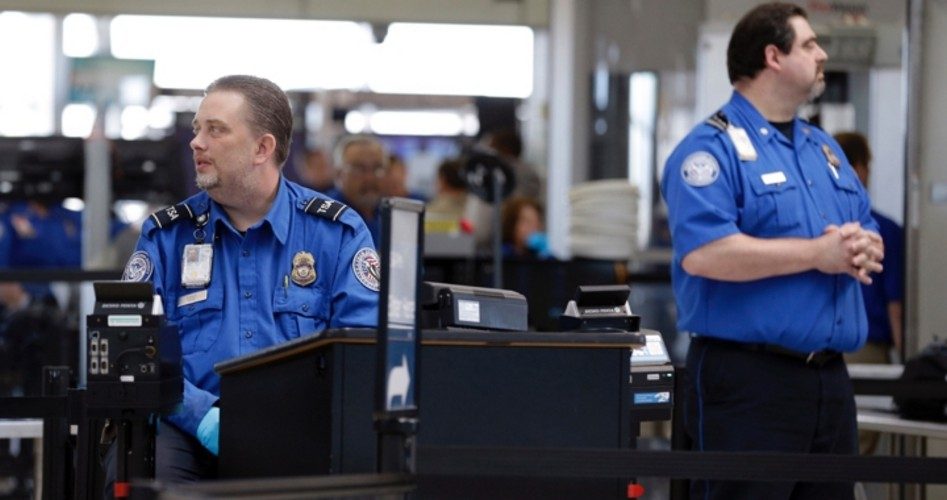
Representative Kathleen Rice (D-N.Y.) has introduced a bill in Congress that would force the Transportation Security Administration (TSA) to adopt “gender neutral” screening policies. While civil libertarians have long criticized the TSA for its privacy violations, transgender-rights activists contend that the TSA’s treatment of transgender and non-binary individuals is the battle worth fighting.
The “Screening with Dignity Act” asks the TSA to implement new training methods and privacy protections. The bill also asks the TSA to conduct a cost analysis for recalibrating full-body screening technology so that transgendered individuals are not “mis-gendered” during the X-ray screening process. The bill’s 15 Democratic co-sponsors want the machines’ technology to be updated so as to be able to “distinguish between foreign objects and human body parts” — presumably at the expense of the taxpayers.
“In 2018, maintaining high safety standards and screening all passengers with dignity cannot be mutually exclusive,” Representative Rice added later, apparently unaware of the TSA’s current practices. “The transgender community deserves to be treated with fairness and respect in all aspects of life, and travel is no exception.”
LGBTQ publication Them contends that under the current protocol, the TSA must indicate in their system whether an individual is male or female before conducting any security protocols involving that individual.
“TSA officers must tell the machine to scan either a ‘male’ or ‘female’ passenger,” Them explains. “The machine will sound an alarm if anyone passes through the gate whose body doesn’t conform to the binary gender system the machine is programmed to understand, and that area of the body will be highlighted.”
According to gender activists, asking individuals questions pertaining to their gender or having to resort to extra screening as a result of being unable to identify an individual’s gender by their appearance are examples of more invasive procedures.
“They used to refer to them as ‘anomalies,’ and people didn’t like that — so now they refer to them as ‘alarms,’” says Harper Jean Tobin, director of policy at the National Center for Trans Equality (NCTE). “We’re hearing from people that TSA officers have said things to them like ‘something in your groin is alarming.’ And nobody wants to talk to strangers about their genitals.”
For Rice, the notion of humiliating transgender individuals is of particular concern.
“No one should have to go through airport security scared that they might be humiliated, discriminated against or outed,” Rice reportedly told Them. “But unfortunately, many transgender and gender-nonconforming individuals worry about this every time they get in line at a TSA checkpoint.”
Them provides first-hand accounts of transgender travelers who have endured humiliation at the hands of the TSA during their travels.
Them contends that the bill is “especially necessary” as the State Department is reportedly making it difficult for transgender individuals to renew or apply for passports that reflect the gender with which they identify.
In an e-mail to Them, TSA spokesperson Lisa Farbstein acknowledged that the agency “recognizes the concerns that some members of the transgender community may have with certain security screening procedures at the nation’s security checkpoints.”
According to Farbstein, when an alarm is triggered by a transgender individual, additional screening is conducted to ensure that the individuals are not in possession of a prohibited item.
Of course, critics of the TSA have long contended that the TSA is already guilty of invasive and unconstitutional behaviors, regardless of whether the passenger is transgender or not. When travelers are selected to be scanned by airport full-body scanners, which show screeners what basically amounts to a black-and-white “nude” image of the person being scanned, the only alternative they are offered is a fairly invasive physical pat-down. Gender activists claim this poses concerns for discriminatory treatment, but what about concerns over the agency’s already-flagrant privacy violations?
As noted by Jeffrey Rosen, a law professor at George Washington University, in a 2010 column for the Washington Post, the TSA is “invasive, annoying — and unconstitutional.”
What’s more, the agency boasts an embarrassingly high failure rate of 70 percent: Last year, undercover investigators working for the Department of Homeland Security’s Office of Inspector General (OIG) were able to sneak fake guns, knives, and explosives through checkpoints 70 percent of the time. The OIG produced an unclassified summary that observed, “We identified vulnerabilities with TSA’s screener performance, screening equipment, and associated procedures.”
But apparently all of that is acceptable — unless the TSA dares to question an individual’s gender. Apparently, that is where the line should be drawn.
Photo: AP Images




